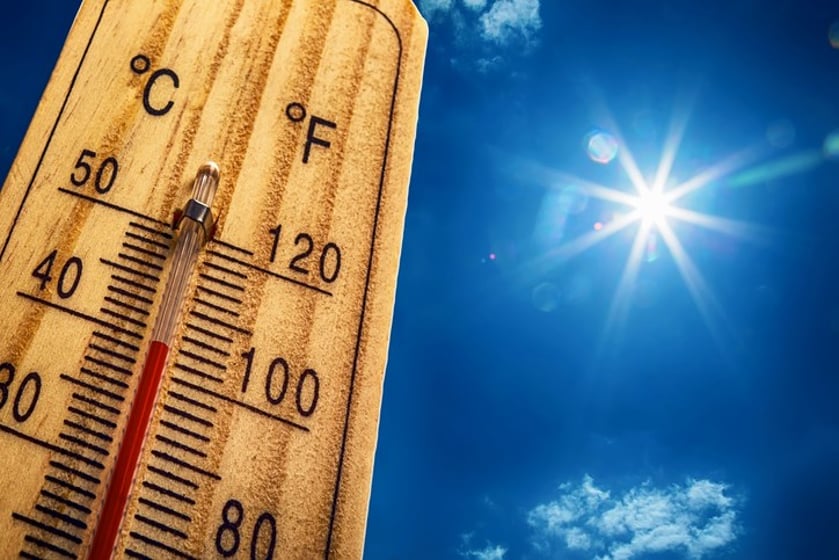Adding temperature setback to unoccupied time periods will save money. Whether you’re winterizing your summer cabin or planning an extended absence over the summer, you might be tempted to turn off your furnace or air conditioning system for the season. Don’t do it! Instead, learn what temperature to leave a vacant house for any length of time in any season.
Winter
In winter, whether you plan to leave for a vacation or for the season, most heating and cooling professionals recommend setting the thermostat to 55 degrees Fahrenheit. This temperature will reduce your heating costs and minimize the risk for hazards such as frozen or burst pipes and flooding. In fact, when leaving a house unoccupied in winter, there are a few additional steps you can take to make sure you don’t return in the spring to a disastrous surprise:
- Turn off the water to the whole house.
- Empty the water pipes by letting the water run in an interior bathroom, the kitchen sink, etc., until there isn’t even a trickle.
- Take out all your trash. Beyond the stench, old garbage can attract curious animals who may be tempted to find a way inside.
- Unplug unused appliances such as lamps, televisions, and game stations.
- Make sure your house is as airtight as possible to keep the cold and critters out while you’re gone.
If you’re only leaving your home during the daytime hours while you’re at work or running errands, it’s fine to leave your thermostat alone. However, if you want to save money on your energy bills, adjusting your settings to a few degrees cooler while you’re away will make a difference
Summer
If you plan to take an extended summer vacation or if you’re a snowbird heading north for the warmer months, you can safely turn your thermostat up to 85 degrees. That setting will prevent sky high energy bills while still running your system often enough to reduce the threat of mold and mildew growth while you’re gone.
With the summer months on the way, vacation days are, too. When you leave your home, it is easy to switch your AC unit off and lock the door behind you without a second glance. Unfortunately, this carefree approach has the potential to backfire, as it is almost always better to run the AC while you are gone, rather than turn it off completely.
Your air conditioner continually removes moisture from the air in your home. Therefore, with your AC unit switched off, your windows and other interior surfaces will often develop a layer of condensation. The trapped moisture quickly results in mold and mildew growth. Without the cooling system running, temperatures inside your home will match or exceed the high temps for each day. Constant high temperatures make building materials, such as doors and flooring, expand and contract, causing them to warp.
Adding temperature setback to unoccupied time periods
To avoid part failures that could cause a system shutdown while you are gone, perform preventative maintenance tasks for your air conditioner before you leave. In general, you will need to change the filter, clear the drain lines, and check the vent flaps to prepare the cooling system. If you notice any problems with your system, schedule an appointment with your AC repair professional for a quick fix before you go.
Right before you leave for vacation, set the thermostat to a temperature that is between 5 to 10 degrees higher than your normal setting. By turning up the temperature, you can save money on energy costs while continuing to reap the benefits of leaving your AC running. Professionals state that 85 degrees is the best temperature to set your AC while away because it resembles outdoor weather. According to energy.gov, “The smaller the difference between the indoor and outdoor temperatures, the lower your overall cooling bill will be.” Just be prepared to deal with a warm house when you return.
If you want to come home to comfortable temperatures, consider having a digital thermostat installed. With this device, you can control the temperature settings from a distance using your Smartphone. Otherwise, you will need to set the thermostat back down to a comfortable temperature and wait several hours for your home to cool off again after coming back from vacation.
- Close all blinds and curtains- to keep the heat out as much as possible
- Leave bedroom doors open- for better airflow
- Unplug all electronics and appliances- to keep the house cooler
- Take out the trash and do your laundry- body oils attract moisture and create mold
Adding temperature setback to unoccupied time periods
By properly preparing and setting your air conditioning unit before your vacation, you can avoid having to worry about your home while you are away. Upon returning from your trip, you will just be able to sit back, relax, and recuperate from your fun vacation without worrying about the state of your home or AC unit. Following these tips will prevent you from paying too much in air conditioning costs while still protecting your home from the extreme heat.
Contact us
If you have an upcoming heating project, join hands with a licensed and insured contractor at East Coast Mechanical. Email: ecmcecmc@aol.com Address: 5133 W Hurley Pond Rd Suite A, Wall Township, NJ 07727 Hours: Monday to Friday 8 AM to 5 PM and Closed Saturday and Sunday.

